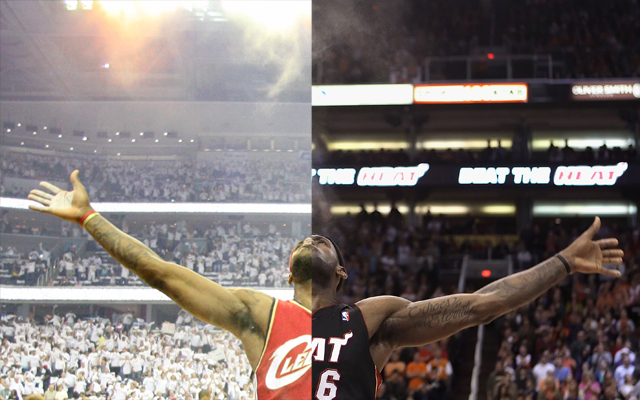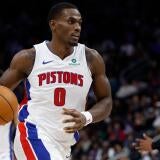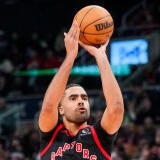Decision 2.0: What if LeBron James re-joined the Cavaliers?
A look at the roster and makeup of the Cavaliers as an option for LeBron James. Can he come home again? Would it be the same, or better?

More on LeBron: James' free agency page | Doyel: NBA revolves around LeBron
The hot buzz since Sunday has been about LeBron James possibly coming "home" (he's actually from Akron) to Cleveland to rejoin the Cavaliers. The idea sparks a conversation that's mostly about narrative. How will he and Dan Gilbert make amends after the letter? How will Cleveland fans embrace him? What does this do for his legacy? Does this erase the "pain" of James leaving the first time?
But there's still the little matter of "What kind of team would Cleveland be?"
Let's look at an expected roster for the Cavaliers if they were to liquidate Jarrett Jack to make room for a max offer to James.
PG: Kyrie Irving
SG: Dion Waiters/Andrew Wiggins
SF: LeBron James
PF: Tristan Thompson/Anderson Varejao
C: Anderson Varejao/Tristan Thompson
Bench G/F: Andrew Wiggins/Dion Waiters
Bench F: Anthony Bennett
Bench G: Matthew Dellavedova
Bench C: Tyler Zeller
Bench G: Carrick Felix
Bench F: Sergey Karasev
Bench C: Brendan Haywood
Bench F (maybe): Dwight Powell
They're going to have a hard time creating cap room to add anyone beyond that after picking up Haywood's contract on top of James' estimated $21 million opening-year contract. There might be some trade or cap razzle dazzle management to create another player or so, but as of right now, let's look at how they'd look if they added James and went with what's on roster.
First off, this is a young team, brutally so. Every heavy-rotation player outside of Varejao (31) is under 25 years of age. Wiggins is 19 turning 20 in February, Bennett and Karasev will be 21 next year. That's an extremely inexperienced roster to try and win a title with. Typically speaking, young rosters don't do well in playoff situations. It's not just handling the pressure, it's coming through with understanding clock situations, managing playoff defensive pressure, and veteran moves. There's a lot a player learns between 25 and 30. Just look at how James has evolved since he was 24. So that's a downside.
It's also a radical departure from the situation he had in Miami. There's no dynamic slashing on-ball creator like Wade. Waiters has a little bit of that (and has been compared at times) but is more muscle and less flair, though he's a superior three-point shooter. Wiggins could very much emulate a bigger Wade, but his shot is not even close to what Wade's was, or is. He can cut off-ball like a maniac though, and James could operate as a high-post lob-artist to Wiggins' acrobatics.
He's also missing a Bosh, to no surprise. Thompson still has upside and is evolving into a very good player, but his hands are stone and he has very little in the way of a perimeter game. Varejao's best days are behind him, and he's much more hustle and grit than precision and skill.
In many ways, this roster most closely resembles the teams that he played with in Cleveland before he left. I'll give you a minute to stop wincing. Varejao is similar to Ilgauskas in his touch and savvy, though more mobile and an elite rebounder. Instead of looking at the 2010 team, the last team James played on before departing, let's look at the 2009 team that won 66 games. The 2010 team had more names, but given what Antawn Jamison had devolved into at that point, the 09 team might be a better comparison of the dynamic.
Ben Wallace and Ilgauskas at that point had more experience and strength than Varejao and Thompson, but those guys are likely, combined, more skilled or at least more mobile, which fits better in the modern NBA. (Remember, the 09 Cavs lost to the Magic due to their floor spacing, a preview of the perimeter stretch-four oriented ways that have come to vogue today.)
The big key, though, is at point guard. It's a joke now, but it's important to remember that Mo Williams' 2009 All-Star spot, though a fill-in, was legitimate. He really was that good this season. 17.8 points per game on 47 percent shooting and 4.1 assists. Irving averaged 20.8 points per game and 6.1 assists last season on just 43 percent shooting. The question becomes how Irving would adjust if James joined the team as the primary ball-handler. There are two schools of thought here:
1. It's LeBron James and you give him the ball. He's the best player, a brilliant playmaker and distributor, and a monster driving to the basket. Also, he's become an elite three-point shooter so you can't play off him. He needs the ball. So Irving's going to have to learn to play off-ball and hit from catch-and-shoot opportunities. The big key here would be Irving being ready to make the extra pass from stationary position. Irving has great vision and feel for the game, and he could create a huge amount of assists off James driving and kicking. But moving to a primarily off-ball situation could be problematic.
Now a big key here is that Williams averaged 6.1 assists per 36 minutes with James off the court in 2009, and 22 points per 36 minutes in 2009. With him on, he averaged 17.3 points and just 3.7 assists per 36 minutes. Irving could feast on bench units if he sits for parts of the first and 3rd quarter while James rests, then finishes the game alongside James. Irving would have to adapt, but he's a smart enough player to.
2. The other line of thought is that James is getting older. The mental and physical grind of dealing with defenses guarding him full-court, especially in the playoffs, wore on him. Giving Irving that responsibility is like being able to use Mario Chalmers in a useful way. Irving can set the offense and focus on using all the weapons he'd have at his disposal. James then transitions from being the quarterback to the wide receiver. He takes a lesser role in the offense, saving his body and prolonging his endurance (which was severely challenged last year) while still murdering teams with his driving ability and taking over when called upon.
This would be the smarter approach, but James is of course still going to have the ball in his hands the most. He's James.
Wiggins is an interesting element here. There is debate about whether Wiggins projects as a 2 or a 3. Let's say that Wiggins is further along in his progression than expected. You could roll out this lineup:
PG: Kyrie Irving
SG: Dion Waiters
SF: Andrew Wiggins
PF: LeBron James
C: Anderson Varejao
That puts the five best players on the floor. This is the same approach that lead to the Heat's smallball approach which helped them dominate in 2012. You've got shooters in the backcourt, athleticism at the 3, James' omnipresence at the 4, and Varejao's defense and rebounding at the four. With the speed they have, they could be devastating defensively. Wiggins is hyper-athletic, Waiters is incredibly strong at the 2-guard spot. Irving's the only real issue defensively and with Wiggins, Waiters, and James, you can effectively hide Irving on the weakest weapon for the opponent.
Speaking of defense, no matter the opening lineup, their bench unit projects as better than what James has in Miami. Dellavedova is a downright pain. He's quick and aggressive, and consistently makes plays without overgambling. As Zeller progresses physically, he can capably handle defense inside and a bench rotations of he and Haywood would cover for one another effectively.
Anthony Bennett is a wild card. He was horrible last year, plagued by injuries and sleep apnea but made significant strides as the year went on. He's not a lost cause and if he develops, he could take Thompson's spot in bigger lineups with his touch and muscle.
There's one more element in play here, and that's coaching. Mike Brown, reviled now for his failures in Los Angeles and his second-stint in Cleveland, built a 66-win team that made the Eastern Conference Finals several times, the Finals once. Erik Spoelstra made the Finals four times in a row, a job that goes overlooked because of the talent. But managing that talent is one of the hardest things to do, a job that Brown struggled with. Spoelstra is legitimately a top-five coach.
David Blatt? No one knows. You can talk about his international experience til you're blue in the face. The number of coaches who have struggled making the transition from international to the NBA, especially in their first stint is a mile long. "Ball movement!" "Fluidity!" The Spurs buzz words drip off this hire, but in reality, we just don't know what kind of a coach Blatt will be. And that uncertainty should be a drawback when James assesses Cleveland. They took a risk with Blatt because at the time, it looked like they could afford to.
LeBron James needs nothing with risk. He's above that. So the coaching issue is a question mark, here.
Is this team better than the Heat team last year? It's complex. There's more raw talent, given that last year's Heat team was running on Shane Battier's fumes, Ray Allen's emergency supply, Wade looked half-dead, and the Heat couldn't find a single capable big. But the experience issue matters here. The Heat knew how to win. With Josh McRoberts and Danny Granger effectively in Rashard Lewis' role, and with whatever moves Riley still has up his sleeves, the Heat may not have as much raw talent, but may be better at winning than this Cavs team. But when you look at this prism, combined with the allure of returning home, you see why James could find the Cavaliers very interesting.
So too is the prospect of the Cavs' sustainability, as Ken Berger of CBSSports.com describes:
They just locked up point guard Kyrie Irving to a five-year deal and have 2014 No. 1 pick Andrew Wiggins under their control for the foreseeable future. They potentially will have three first-round picks in 2015, which can be used to add youth or in trades to import complementary veterans. They have the means to create room to be significant players in free agency in each of the next two summers.
via For LeBron, Decision 2.0 could be about sustainability - CBSSports.com.
And then, of course, there are the narratives, the human elements, which are very real. LeBron hosts a charity bike ride every season in Akron, has done so every year, even after The Decision. He maintains a home there, he summers there with the kids, his team's marketing offices remain in Ohio.
It's one thing to leave home, most people do as part of their maturation and advancement of their lives. It's another to leave bridges burned and hearts broken in a place you love so dearly. Some people have no fondness for where they're from. They're able to pack that part away and move on. James has always been sensitive to people, those who make an impact on him. "La Familia" as it goes. Cleveland and the state of Ohio are embedded in his DNA, an inescapable part of who he is. There are no tax benefits to heading to Cleveland. There's no marketing gain. It doesn't help his goals to break into the entertainment industry.
But Ohio is home. And sometimes, beyond all the X's and O's, that can trump everything.
We'll see what James decides.

















